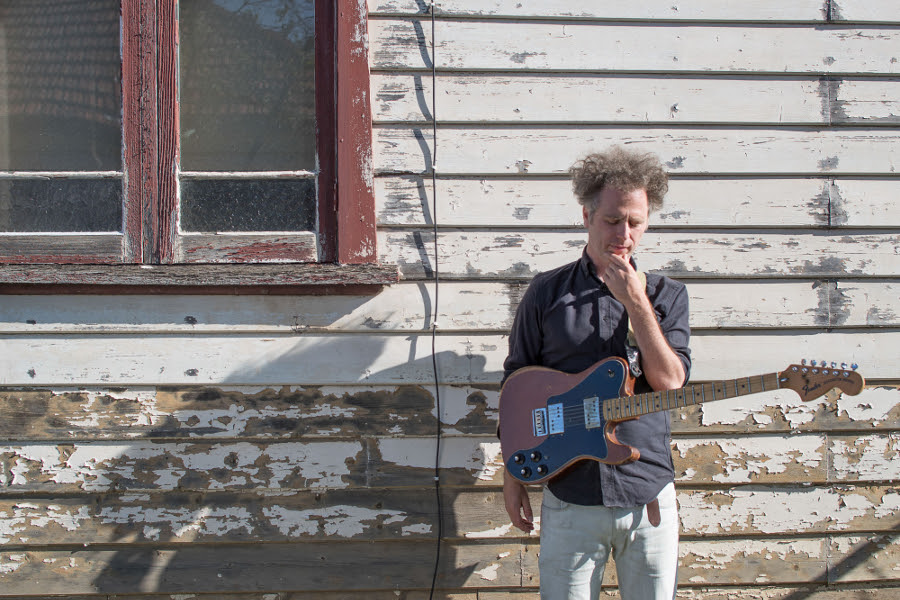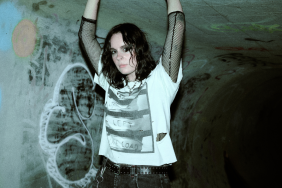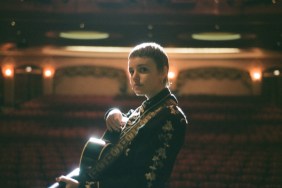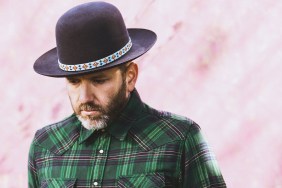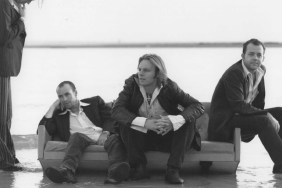Toby Martin knows his way around a song. At the helm of Sydney band Youth Group, the singer-songwriter has penned some truly memorable and inspired indie-rock – ‘Shadowland’, ‘Skeleton Jar’, ‘All This Will Pass’ and ‘Daisychains’ among them. These, however, were songs written by Martin in solitude, privately focused inward and not for the consumption of anyone but his bandmates until completion. What would happen, then, if Martin’s process was revealed to the public – and quite literally, too? As a part of a theatre project, Martin found himself on the streets of Bankstown, attempting to write new songs in unfamiliar territory and with anyone able to stop and watch.
Through this experiment, however, Martin has emerged with perhaps his finest album to date. The 41-year-old father of two, who now resides just outside of Manchester in England, assembled local musicians from the Bankstown community – as well as a couple of old friends – to put together his second solo album, Songs from Northam Avenue. The result is a challenging, gripping and resplendent album; one that paints the portrait of Sydney’s outer reaches the way that only a veteran songwriter knows how. Already a major contender for album of the year, …Northam Avenue is an essential listen for those that admire true creativity and vividly-detailed storytelling.
Ahead of a launch for the album on April 29th at Sydney’s Carriageworks, Martin spent half an hour with Music Feeds on the line from his new English home to talk shop on the sights, sounds and people of Bankstown. Welcome, one and all, to Northam Avenue.
Music Feeds: Let’s talk about the origins of you writing music out in Bankstown. The project seemed to be a really interesting experience – almost like a writers’ retreat of sorts.
Toby Martin: It may have seemed like that, but it felt more like a bootcamp. [laughs] The background is that I’d done a bit of work with a group called Urban Theatre Projects – I did music for a show that they did. They’re a very interesting group – they do community-based theatre, and they try and involve locals as often as possible. They invited me to be a part of their next project, where they sent artists out to different parts of Sydney to use someone’s front yard as a sort-of studio. We were there for two weeks, and my front yard was an abandoned house on Northam Avenue in Bankstown – hence the title of the album. I was basically sitting on a nature strip with a desk, a chair, my guitar, my phone and a notebook. People would be walking and driving past all day as I was trying to write and play songs.
MF: That’s such a vulnerable position to put yourself in, especially given the nature of the kind of music that you usually write.
TM: It really is. I like writing music by myself – I even get embarrassed if my partner overhears me, or if my flatmates ever heard me back when I used to live in sharehouses. Those first few days, as you can imagine, were really weird. After a while, though, I got the hang of it and started to really enjoy it. In fact, I loved it so much that I volunteered to do another one. I ended up in Bankstown again, this time at a corner store. It operates as a milk bar where you can get coffee and things like that; and Michael, the owner, has a bunch of tables out the front. This was even more public than the last one, but I was really invested in the process by that point. It became my 9-to-5, just writing away each day. Some mornings, Michael would have people over to the store for coffee; and I’d come and talk with them. That’s where all of these songs on the album originally began.
MF: Both Songs from Northam Avenue and your last record, Love’s Shadow, are under your own name as solo records. There was a lot of key collaborators on both, however – and in Northam’s case, it was with very different musicians than you’d normally be playing with.
TM: That’s right. I did have one key collaborator from my past on this record, though. Bree van Reyk helped to produce this record and she played drums on it as well, so she has a lot to do with this record. She’s amazing – definitely one of the best drummers in Australia. Not only that, but she has so many amazing musical ideas. She’s a great composer, and she had such a great vision for this record. It was her idea to use the children’s choir on ‘Spring Feeling’, to give you an example. You’re right, though, in that everyone else was very new to this. Everyone that played on the record were people that I met while I was writing in Bankstown. It came together through very loose connections, mostly through friends of friends. There was even one instance where I was literally just calling up a Lebanese folk music society and getting some phone numbers from them.
I suppose that, for the entire time that I was writing Northam Avenue, I was envisioning it being filled out in their recordings by people from the area. I was really interested in the idea of having people play on this record that were different to the kind of music that I make. That sort of set me off on this journey of meeting people, and I encountered the most amazing characters and personalities. It was really eye-opening. I lived in Sydney for nearly all of my adult life, and you really think that you know a place once you’ve spent so much time there. Experiences like this can really drive home this idea that you’re living in a bubble. My inner-west, indie-rock bubble didn’t know anything about the west, or about the Vietnamese music scene. It’s full of all these very welcoming, incredibly talented musicians who immediately said yes to being involved.
MF: How did these musicians influence the direction of the recordings? One would imagine that, coming from a very different school of music, their ideas of arrangement would come from a very different place to yours.
TM: Absolutely. It’s really interesting to see the way things are different to what you expect. A guy called Alex played on the record – he’s this older Lebanese-Australian guy, and he plays oud and keyboards. He was the first person that I met when I was seeking out musicians for the record. I’d heard that he played the oud, and I wanted that as a part of the arrangement. I went over to his house, he showed me his oud and played for a bit. After a while, he stopped and said “You know what? I’m actually more of a keyboard player.” He pulls out this Yamaha keyboard, fires up the drum machine on it and just goes for it. There was also a woman called Lan, a Vietnamese woman who had this whole chain of instruments to choose from when it came to playing on the record. Whatever she went with really influenced how the song sounded.
MF: Did you hit any major stumbling blocks while recording Songs from Northam Avenue? Or did it come together better than you may have initially expected?
TM: There’s always roadblocks with these sorts of things. They’re mostly in my own mind, though. I guess one of them, for me, was being an outsider. I wasn’t from Bankstown, and there I was wandering in there and writing about things I didn’t know about, and people I didn’t really know. I mean, I take anecdotes, images and stories to use in my songs all the time – all songwriters – but there was a part of me that kind of felt like there may have been a perception that I waltzed in, took what I needed and left.
All the people that worked on this album were absolutely amazing, though. I think, with some of them, there might have been a little bit of reticence to start off with. That was to be expected, really – they didn’t really know me, and the recording studio as an environment can be really uncomfortable if you’re not intimately familiar with it. It was nothing major, but it was definitely a gradual process of people getting more used to it and getting better rehearsed. By the time we were recording in earnest, I think there was a really positive energy in those sessions. Everyone was really up for it, and it made for a really great experience.
In rehearsals the week before, I was honestly at a point where I wasn’t sure if it was going to work at all. People didn’t quite know what was going on, and the fact we were recording it live in the studio made me feel like we were really under-rehearsed. In the end, I just had to kind of trust in everyone. I said to myself, ‘Either it’s going to work or it’s not.’ We went for it, and I think that it worked largely due to the generosity and willingness of the group of musicians Bree and I were working with.
MF: Recording live definitely ups the ante – how did that factor in?
TM: It just felt natural – and when it was happening, it felt like we were capturing a lot of magic moments. Some of the songs on the album are completely live, even my vocals – the song ‘Olive Tree’ was recorded that way, with no overdubs. A lot of the time, it was non-verbal communication. It’s a bit of a cliché, but there were times where we were just like, “Let’s not talk about it. Let’s just play and see what happens.” We were able to work out quite a few parts by using this method. Sometimes, you’ve just got to put yourself in a compromising or uncomfortable position creatively, just to see what will happen.
MF: You’ll be performing a one-off show at Carriageworks in Sydney this coming April, where you’ll be performing Songs from Northam Avenue with many of the key collaborators on the album. That must be an exciting prospect; especially considering how long it’s been since your last solo show in Australia.
TM: I don’t know where you heard that – it’s just going to be me and a microphone, singing to a karaoke backing track. [laughs] Yeah, the gang’s coming together for it. Lan, who plays the Vietnamese instruments; and Mohammed, who plays the Qanun, are going to be joining me. Unfortunately, Alex has moved to Adelaide, so he won’t be joining us. Bree will be playing drums, though, and we’re going to have a bass player in the mix as well. It’s going to be a lot of fun to have all these crazy multi-stringed instruments on the same stage at the same time. We’re going to try and do a couple more, as well, but it hasn’t quite been confirmed yet.
MF: Lastly, any word on Youth Group? Yourself, Pat and Cameron got together to play a one-off show in Sydney last December, and there was talk of a fifth album from you guys. Is that still on the cards, even with you living in the UK and Danny over in the US?
TM: Yeah, it is. It’s the slowest process, it’s been ridiculous. I think it’s coming up to nine years since our last album [2008’s The Night is Ours]. It doesn’t feel like all that long ago. It’s funny – I look at photos from when my six-year-old was born, and the first thing I notice is how much younger I look. “Forget about her! What about me?” [laughs] But I digress. Both Danny and myself are going to be in Sydney in April, so we’re going to be doing some recording around then. We’re gonna try and bash something out with the time that we’ve got to see if the magic is still there.
MF: Do you think that your experience in writing Northam Avenue has influenced your songwriting since then?
TM: I really think it has. It’s funny – when I moved to England after the Bankstown thing, I rented out an abandoned laundromat in my village and made it my songwriting home for two weeks. I kept it open, so I’d have people coming in and out all the time. I’d gotten over my initial embarrassment and was really enjoying it. When I looked at the songs that I was writing, I realised that they were all really Youth Group-y. I thought, for some reason, they’d come across as more English, but instead they were still very much Australian. It felt a bit like a cliché, being an Australian in England and just writing songs that sound like home. Still, those are the songs we’re gonna be recording. So we’ll see how that goes.
–
‘Songs From Northam Avenue’ is out now. Toby Martin will be performing at Carriageworks, Sydney this April. Details below.
Toby Martin Album Launch
Saturday, 29 April 2017
Carriageworks, Sydney
Tickets: Carriageworks
